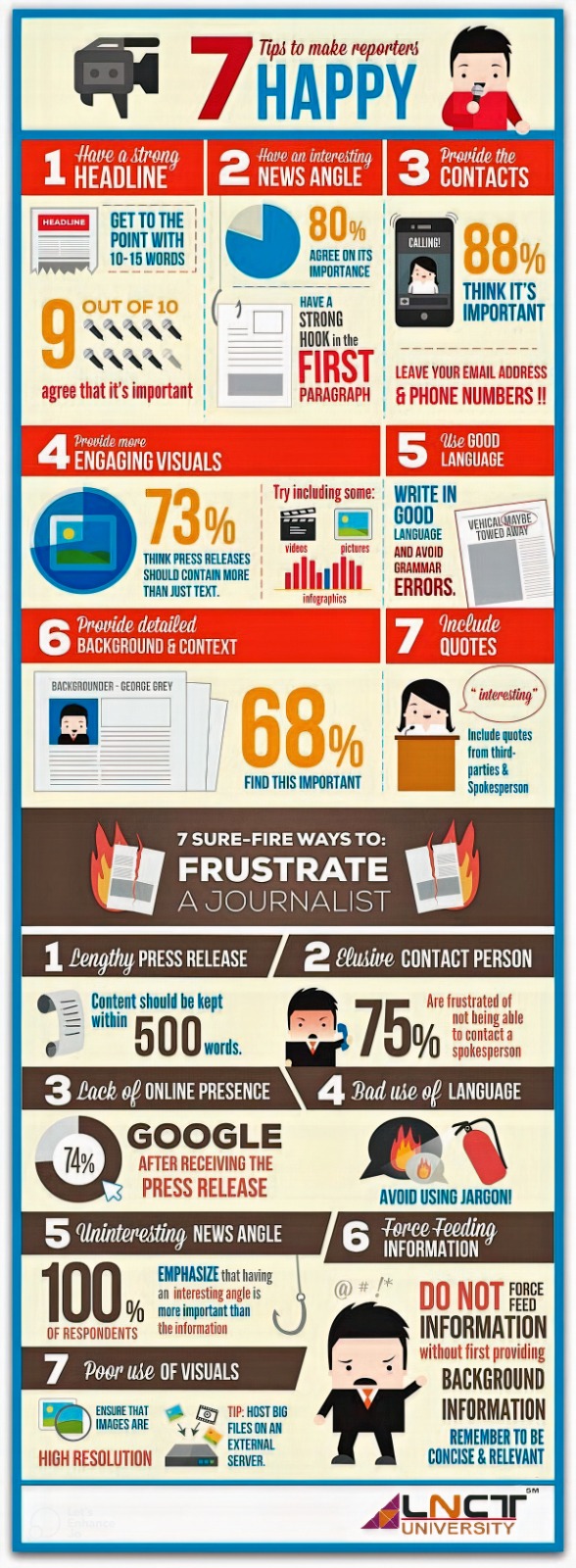A Complete Step-by-Step Guide to Successful Journalist/Reporter by School Of Journalism & Mass Communication LNCT University
Step-by-Step Guide
Step 1: Develop Strong Communication Skills
- Improve your writing skills by practicing regularly, focusing on clarity, coherence, and effective storytelling by School Of Journalism & Mass Communication LNCT University .
- Enhance your speaking skills through public speaking opportunities, such as joining debate clubs or participating in toastmasters. Develop active listening skills to understand different
- perspectives and gather accurate information.
Step 2: Pursue Journalism Education or Training
- Research universities or institutions that offer journalism programs or certifications.
- Look for courses that cover subjects like reporting, news writing, ethics, media law, and multimedia journalism.
- Consider joining journalism organizations or clubs to gain exposure to industry professionals and opportunities.
Step 3: Gain Practical Experience
- Seek internships or entry-level positions at news organizations, both traditional and digital media outlets.
- Contribute to campus or community newspapers, magazines, or online publications.
- Offer to write guest articles or volunteer for local news outlets to gain more hands-on experience.
Step 4: Cultivate News Sensibility
- Develop the habit of regularly consuming news from various reliable sources.
- Follow trusted news organizations, read newspapers, and explore online news platforms.
- Analyze news stories critically to understand their structure, angles, and the impact on different audiences.
Step 5: Hone Research and Investigative Skills
- Learn how to conduct thorough research using credible sources, including interviews, data analysis, and academic research.
- Practice fact-checking to ensure accuracy in your reporting.
- Develop investigative skills by learning how to uncover hidden information, follow leads, and connect the dots.
Step 6: Develop a Niche or Beat
- Explore different areas of interest within journalism, such as politics, business, sports, or arts and culture.
- Gain in-depth knowledge about your chosen niche by reading specialized publications, attending relevant events, and building contacts within that field.
- Establish yourself as an expert by consistently producing high-quality content related to your niche.
Step 7: Build a Strong Network
- Attend journalism conferences, seminars, and industry events to meet professionals in the field.
- Join journalism associations or organizations, such as the Society of Professional Journalists (SPJ), to connect with like-minded individuals.
- Utilize social media platforms like Twitter and LinkedIn to network with journalists and editors.
Step 8: Uphold Ethical Standards
- Familiarize yourself with ethical guidelines and codes of conduct set by professional journalism organizations.
- Maintain objectivity, fairness, and accuracy in your reporting.
- Respect privacy, seek consent when necessary, and handle sensitive information responsibly.
Unlock Your Career Potential: A Step-by-Step Guide to Building Your Future
- A Complete Step-by-Step Guide to Success in NEET/AIIMS
- A Complete Step-by-Step Guide to Successful Journalist/Reporter
Remember, these steps serve as a general guide, and the journalism field is ever-evolving. Stay curious, adaptable, and committed to lifelong learning to thrive in this dynamic profession.
Top 10 Tips for Young Aspiring Journalists
- Find Inspiration: Discover your passion for storytelling and writing early on. Cultivate your talent and develop a love for journalism.
- Seek Education: Pursue a journalism degree and consider double majoring in a different field to diversify your skills and knowledge.
- Explore Job Opportunities: Journalism jobs can be categorized into broadcast (TV, radio), print (newspapers, magazines), and online platforms. Research and understand the various opportunities available.
- Consider Location: The market you work in significantly impacts your journalism career. Major media companies are often headquartered in cities like New York, Atlanta, Washington, D.C., Los Angeles, and overseas in places like London and Hong Kong.
- Embrace Competition: The field of journalism is highly competitive. Be prepared to work hard to secure a job, maintain it, and advance in your career. Focus on performance and continuously strive for excellence.
- Understand the Process: Gain practical experience through internships, part-time positions, and freelance work. Build a strong portfolio of published work and develop relationships within the industry.
- Start Early: Begin your journey in journalism as early as possible. Pursue internships and entry-level positions to gain exposure and meet professionals in the field.
- Understand Pay: Salaries in journalism can vary, with reporters, correspondents, and broadcast news analysts earning a median salary of ₹15,00,000. Research salary ranges for your specific position, company, and market. Don’t be afraid to negotiate for better compensation.
- Value Relationships: Build and maintain strong relationships with mentors, colleagues, and peers. Invest in networking and foster connections with industry professionals. Good relationships can open doors and provide opportunities.
- Risk vs. Reward: Journalism can be challenging and emotionally demanding. Understand the risks involved, such as industry contraction and intense competition. However, remember that trusted news sources are always in demand, and journalism remains essential in society.
- Despite the evolving landscape of the industry, the need for journalism and trusted news sources persists. With passion, dedication, and a commitment to excellence, aspiring journalists can navigate the field and make a lasting impact.
Q1: What skills are essential for a successful journalist/reporter?
A1: Strong communication skills, including writing, speaking, and active listening, are crucial. Research and investigative skills, adaptability, and the ability to meet deadlines are also important traits for journalists/reporters.
Q2: Do I need a journalism degree to become a journalist/reporter?
A2: While a journalism degree can provide a solid foundation, it is not always a requirement. Practical experience, internships, and a diverse skill set can also help you succeed in the field.
Q3: How can I find job opportunities in journalism?
A3: Explore traditional media outlets such as newspapers, magazines, and broadcast stations, as well as online platforms. Websites like mediabistro, JournalismJobs, and Indeed can be valuable resources for finding journalism job openings.
Q4: Is location important for a career in journalism?
A4: Yes, the market you work in can have an impact on your career. Major media companies are often concentrated in metropolitan areas. Consider the opportunities available in different locations and be open to relocating for career growth.
Q5: How competitive is the field of journalism?
A5: Journalism is a highly competitive field. There are fewer journalism jobs available, and the industry is constantly evolving. To succeed, you need to continuously improve your skills, stay updated with industry trends, and be willing to work hard to stand out.
Q6: How important are internships in journalism?
A6: Internships are valuable for gaining practical experience, building contacts, and learning about the industry. They provide an opportunity to showcase your skills and may lead to future job opportunities.
Q7: How can I negotiate for better pay in journalism?
A7: Research the average salary range for your position, company, and market. When negotiating, highlight your qualifications and experience. Emphasize the value you bring to the organization and be confident in advocating for fair compensation.
Q8: How can I develop strong relationships in the field of journalism?
A8: Networking is essential in journalism. Attend industry events, join professional organizations, and build relationships with mentors, colleagues, and peers. Maintain good relationships with sources and subjects as well, as they can contribute to your professional growth.



